Scratch Shoebox Lander Original Design / Scratch Built
Scratch - Shoebox Lander {Scratch}
Contributed by Heather Myers
| Manufacturer: | Scratch |
The following is the HTML
interpretation of Heather's PDF submission.
Please see the full PDF HERE (16M)
INSTRUCTIONS
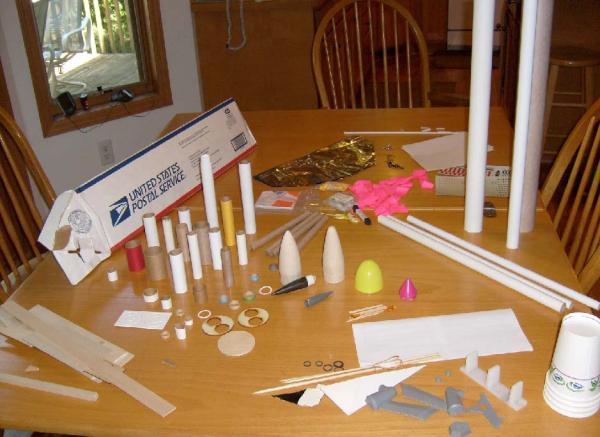
This is my box of parts! To build my design, you will also need:
- Wood Glue
- Super Glue
- XActo Knife
- Razor Saw
- Scotch Tape
- Clay for noseweight
- Scissors
- Pencil
Find the wood skewers and rubber bands bundle and separate
them.
Cut the pointed end off of each of the three smaller sticks.

Next, take one of the paper cups and make three marks evenly spaced
around the bottom rim of the cup.
Poke three small holes through the rim of the cup, then push a rubber
band through each hole.
Thread each rubber band through itself as shown to secure the rubber
bands to the cup.
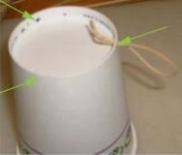
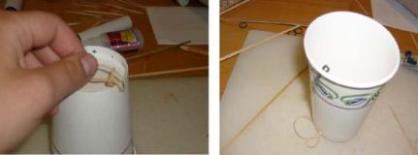
Find the plastic piece in the picture on the left and cut it into three pieces and cut excess plastic off. Glue the pieces with wood glue so that the raised part is over the purple line on the cup and in line with the rubber band holes.
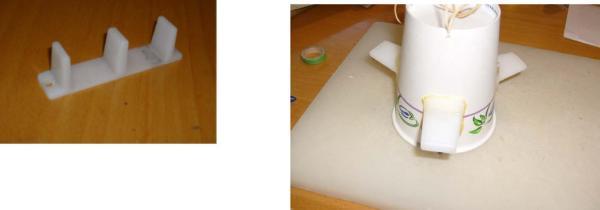
Next, slide a skewer through both loops of one black rubber band, then do the same with the other two. Slide the other end of each skewer through the corresponding brown rubber band, then loop each rubber band again to tighten the bands.
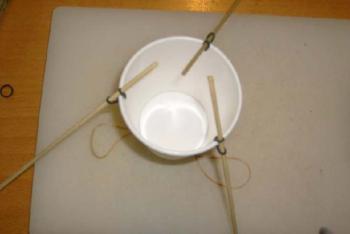
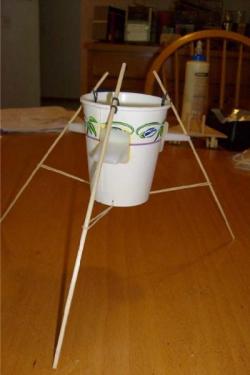
Now find your 3" by 11 1/8" piece of balsa and cut it into four 3" by 2 3/4" pieces. There will be a small scrap piece left over.
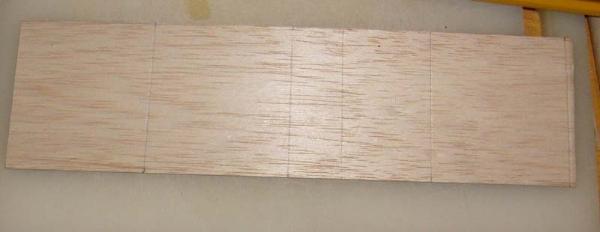
Cut four pieces of BT-60 tube and four pieces of BT-50 tube 4 1/2" long.
Cut eight pieces of BT-5 tube 3 1/2" long.
To do this, you can cut a strip of paper 4 1/2" (or 3 1/2") in width, then wrap the paper strip around
the
tube flush with the bottom of the tube and mark around the tube along the top of the paper.
Cut on the mark with the razor saw.
Next, cut out the fin guide below and tape it around the BT-70 tube.
Mark the tube above and below each line on the guide.
Now use the marks to draw a straight line along the length of the tube. A doorframe makes a good
straightedge for for marking tubes.
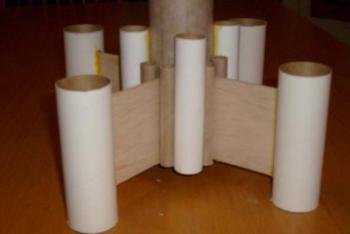 Use super glue to attach the BT-20 tubefins along every other line with the bottom of the body tube even
with the bottom of each tubefin. Fillet with wood glue along both sides of each tubefin.
Use super glue to attach the BT-20 tubefins along every other line with the bottom of the body tube even
with the bottom of each tubefin. Fillet with wood glue along both sides of each tubefin.
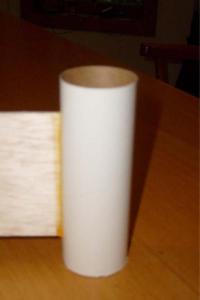
Next, glue the balsa fins along the other four lines, also even with the bottom of the BT-70 body tube. Use super
glue to attach the fins, then wood glue to fillet.
Use a doorframe or another straightedge to draw a straight line along the length of each BT-50 tube section. Next, measure and make a mark on the line 3/4" from each end of the tubefins. Use super glue to attach the BT-50 tubefins to the balsa fins. Line up the balsa fins along the line and between the marks on each tubefin. Fillet with wood glue.
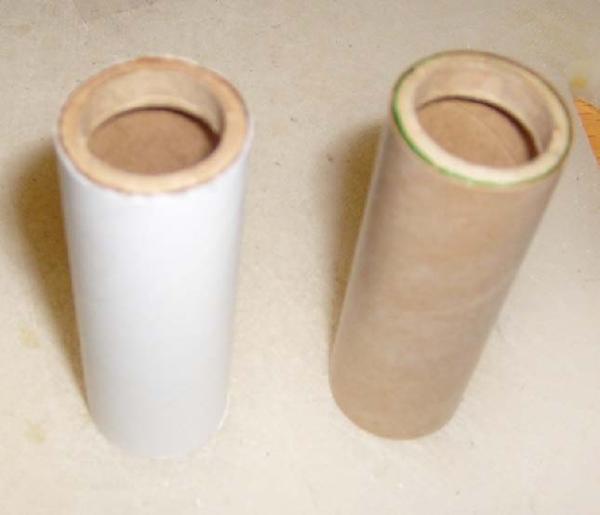 Cut two small
sections of BT-50 tube to 2 3/4" in length. Use wood glue to glue an engine block into the end of each tube, flush
with the top of each tube section. Measure and put a mark 1/2" from the bottom (opposite the engine block) of each
tube.
Cut two small
sections of BT-50 tube to 2 3/4" in length. Use wood glue to glue an engine block into the end of each tube, flush
with the top of each tube section. Measure and put a mark 1/2" from the bottom (opposite the engine block) of each
tube.
Test fit and sand the centering rings if necessary. Use wood glue to glue one centering ring flush with the top of each tube and the other even with the 1/2" marks on the tubes. Glue the motor mount inside the BT-70 body tube so that the bottom centering ring is flush with the bottom of the body tube.
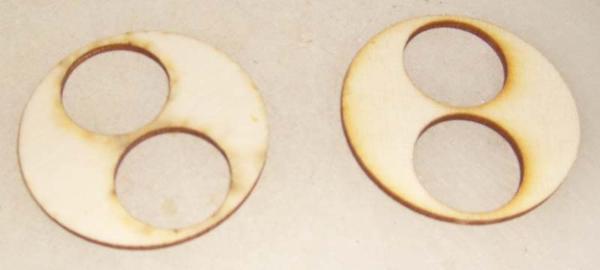
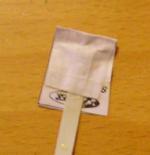 Find the package of shock cord and cut out the two big shock cord mounts. Glue with wood glue and fold the
shock cord into each mount, then glue one to the inside of the body tube and the other to the bottom of the cup, on the
inside.
Find the package of shock cord and cut out the two big shock cord mounts. Glue with wood glue and fold the
shock cord into each mount, then glue one to the inside of the body tube and the other to the bottom of the cup, on the
inside.
Glue a section of 3/16 launch lug inside one of the BT-60 tube fins and another halfway up the body tube on the same line the tubefin is glued along. Glue 1/8 lugs where the legs fall when the lander is placed on the rocket and folded up.
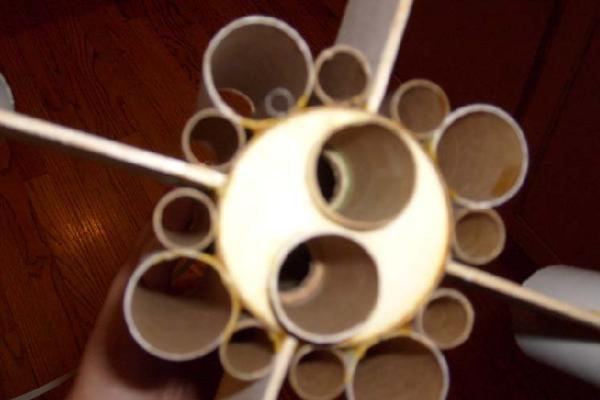
Cut a slit in the side of the cup to accomodate the launch rod. Add noseweight if needed and tape the easter egg half to the bottom rim of the cup. The shroud lines on the yellow parachute are doubled, so cut off one from each point on the chute and put them on the silver chute using scotch tape. Attach the shroud lines packaged with the orange chute with tape. Attach the silver parachute and the orange and white parachute to the shock cord on the booster. I also used string from my box to separate the two. Attach the yellow chute to the shock cord on the lander. Add masking tape (or scotch tape) above the rubber bands to prevent sliding. You are now ready to fly!
My first flight was on two D 12-5s. It boosted well and recovered nicely, with all three chutes deploying. The lander didn't land upright, but maybe after some more fine tuning and possibly adding guides to lock the legs in place, it might land sucessfully!
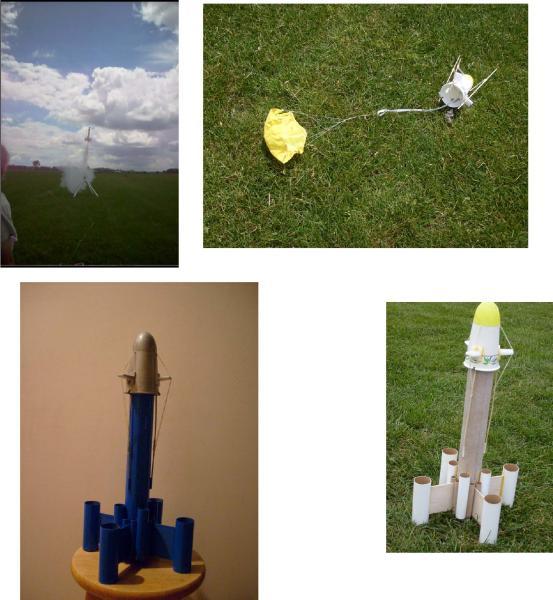
Sponsored Ads
 |
 |











